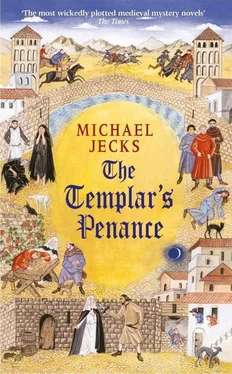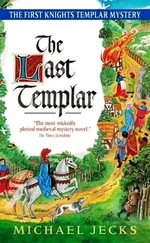Michael Jecks - The Templar
Здесь есть возможность читать онлайн «Michael Jecks - The Templar» весь текст электронной книги совершенно бесплатно (целиком полную версию без сокращений). В некоторых случаях можно слушать аудио, скачать через торрент в формате fb2 и присутствует краткое содержание. Год выпуска: 2014, ISBN: 2014, Издательство: Headline, Жанр: Исторический детектив, на английском языке. Описание произведения, (предисловие) а так же отзывы посетителей доступны на портале библиотеки ЛибКат.
- Название:The Templar
- Автор:
- Издательство:Headline
- Жанр:
- Год:2014
- ISBN:9781472219763
- Рейтинг книги:4 / 5. Голосов: 1
-
Избранное:Добавить в избранное
- Отзывы:
-
Ваша оценка:
- 80
- 1
- 2
- 3
- 4
- 5
The Templar: краткое содержание, описание и аннотация
Предлагаем к чтению аннотацию, описание, краткое содержание или предисловие (зависит от того, что написал сам автор книги «The Templar»). Если вы не нашли необходимую информацию о книге — напишите в комментариях, мы постараемся отыскать её.
The Templar — читать онлайн бесплатно полную книгу (весь текст) целиком
Ниже представлен текст книги, разбитый по страницам. Система сохранения места последней прочитанной страницы, позволяет с удобством читать онлайн бесплатно книгу «The Templar», без необходимости каждый раз заново искать на чём Вы остановились. Поставьте закладку, и сможете в любой момент перейти на страницу, на которой закончили чтение.
Интервал:
Закладка:
‘May we travel with you?’ he asked.
The dour-faced Portuguese glanced at the bodies on the floor. There was a humming sound as blowflies sought out the blood and started to crawl over them. Then he held out his hand and nodded.
They had packed the remaining sausages and a loaf of bread each, filled some jugs with wine, and then made their way out to their horses. Excusing himself for a moment, Paul re-entered the inn when he had loaded their prizes on the packhorse, muttering and tutting to himself, and while Afonso and Charles waited, they heard a short shriek which ended abruptly.
‘Nearly forgot the little sod who hurt your foot, Sir Charles,’ he said when he came out again, wiping his blade clean on a piece of rag.
The recollection made Sir Charles smile. Paul always remembered any unfinished business. Ever efficient, he was the man who went about the dead of battlefields first, always on the lookout for better shirts or boots. ‘You can’t afford to wait until the rooks have landed,’ was his favourite phrase after a fight. Crows he admired. Like him, they went alone or in pairs; rooks were those from nearby vills, who invariably sprang up afterwards in great numbers, massing and robbing wholesale when they had done nothing to share in the profit.
He was drawn back to the present, to his seat beneath a great vine in Compostela, by Paul saying, ‘So now we’ve got here, where do we go next Sir Charles?’
‘You find this city boring?’
‘No. It’s got wine and women. That’s enough for me while there’s a little cash in my pocket. But the money we have won’t last long.’
‘True enough. We need a chance of making some more,’ Sir Charles said.
It was the eternal problem. In the days when they had been kept by Earl Thomas, life had been a great deal easier. Now, acquiring funds had become their chief occupation.
‘If we don’t get some money soon, we’ll have to think of selling the packhorse.’
Sir Charles shook his head. ‘That would be as stupid as throwing away my armour. Without our mounts and our weapons, we’re no better than mercenaries. At least while we have these, we can call ourselves chivalrous.’
‘In that case, we’d best find someone rich who doesn’t mind sharing his wealth,’ Paul said.
Sir Charles nodded. ‘Yes. And if he does mind, we’ll have to persuade him otherwise,’ he grinned.
Just then he caught sight of Afonso appearing through the crowds, moving with his usual rolling gait, a little like a sailor. Sir Charles somehow felt that the Portuguese man had suffered more than he, but Afonso had volunteered nothing more about his past, and he was not the sort of man to blab confidences willy-nilly. He was rather like Sir Charles — self-sufficient, calm and satisfied with his own company. While Sir Charles and Paul were with him, he was content to be their companion, but if they were to leave today, he would not care.
That was his usual demeanour, but today something had upset him, Sir Charles could see. His face was set, and he shouldered a man from his path in an unwarranted display of anger. The man opened his mouth to remonstrate, but then closed it again when he took in the broad back and worn sword of the knight.
‘My friend, what is the matter?’ Sir Charles asked mildly.
‘It is nothing. I saw a man I had not expected, that is all,’ Afonso said.
‘I see,’ Sir Charles said. ‘When we first met, you mentioned someone whom you wished to find. Is this him?’
‘Yes!’ Afonso swore and spat out, ‘Matthew!’
‘Would you like me to come with you and see him again?’
The offer of his assistance in attacking this man, who must surely be an enemy of Afonso’s, did not produce the result which Sir Charles had expected. Instead of giving thanks, Afonso rounded on him, eyes glittering.
‘No. You leave him to me! He is the cause of me being here, and I’ll kill him myself!’
Dona Stefania sat back, her heart pounding as she studied the now-pale knight. ‘You didn’t think I would be able to muster the courage to accuse, did you? Well, I have. I accuse you, Sir Knight, and I hope you will be forced to pay for your vicious crime!’
‘I have done nothing, woman!’ Don Ruy snarled, but Simon was sure that this was not the reaction of the discovered felon, rather the furious denial of a man repudiating his accuser.
‘You killed her!’ she shouted, and there was a kind of delight in saying so, she discovered. It was as though she had found some form of comfort in being able to declare her maid’s murderer’s guilt.
Don Ruy did not retreat or cower, though the other two men closed in subtly. It was the knight called Baldwin who spoke.
‘You have been accused, and you deny the charge, but you give us no explanation of why you are wrongly accused. Will you not explain how someone could think that they saw you, when you say you did not leave the city?’
That’s it! Dona Stefania thought gleefully. Let him wriggle out of that !
‘I did leave the city for a short while,’ Don Ruy said stiffly. ‘I hired a mount from a stable and rode out for exercise. I hadn’t thought it would matter — but then I didn’t expect to be accused of murder for talking to the good Dona Stefania either,’ he added with a bow to her.
He was impressive, she admitted. Suave and calm, even when accused of such a dreadful crime.
‘Where exactly did you ride?’
‘I rode out along the river northwards.’
‘Did you come to a clearing?’
Don Ruy considered. ‘The ground was flat, and I don’t recall one in particular. There was a stretch which looked a little like a ford. I passed by a place where women were washing their clothes.’
‘A ford,’ Baldwin repeated in English for Simon. ‘He says he passed a place that was a ford, where women were washing their clothing.’
‘So?’
‘I hadn’t noticed that it was a crossing place.’ Returning to Don Ruy, he said, ‘The ford — did you see anyone near there?’
‘I saw two horses tied to a tree.’
‘Was there a man there, or a woman?’
‘Over on the opposite side of the river, walking together, away from me. I didn’t see their faces. I don’t know who they were.’
‘Come, Don Ruy! You must remember the girl at least. She wore a blue tunic, with embroidery at the neck and hem.’
‘Very well. Yes. It was the beautiful dark-haired servant of Dona Stefania here,’ he said with a faint smile. ‘Yes, it was because of her that I rode up that way. I noticed her at the city gate, and from interest, I trailed after her up the roadway. She went on ahead at speed, but I slowed because my mount had a stone in its hoof. At first I thought that it was a miserable creature that had been foisted on me, but when I had it out, the beast rode all right. Still, when I got to the ford she had gone already.’
‘Gone where?’
‘Over the river, like I said. One of the horses was hers — I recognised it. It was hot, and what should be more natural than that she should cross the river in bare feet to cool them, before walking with her man?’
‘Which man?’
‘She was with Frey Ramon when I saw her.’
Dona Stefania felt the world tottering about her. ‘No! This is ludicrous! How can that be? Don, how do you know the good Brother Ramon? Do you know him?’
‘I know him well enough, and his horse,’ snapped Don Ruy irritably, and turned to face Baldwin. ‘Our bands of pilgrims were together at Tours until four days ago. His horse is black, with a white flash on the left shoulder that extends up the neck almost to the head. He has a grey ankle on the right rear leg, too. It was his horse, all right. And he was there, too, walking with Joana over on the other bank of the river. I knew her from the journey here to the city. She was with Dona Stefania. It was her I overheard telling of the Dona’s … indiscretion .’
Читать дальшеИнтервал:
Закладка:
Похожие книги на «The Templar»
Представляем Вашему вниманию похожие книги на «The Templar» списком для выбора. Мы отобрали схожую по названию и смыслу литературу в надежде предоставить читателям больше вариантов отыскать новые, интересные, ещё непрочитанные произведения.
Обсуждение, отзывы о книге «The Templar» и просто собственные мнения читателей. Оставьте ваши комментарии, напишите, что Вы думаете о произведении, его смысле или главных героях. Укажите что конкретно понравилось, а что нет, и почему Вы так считаете.












